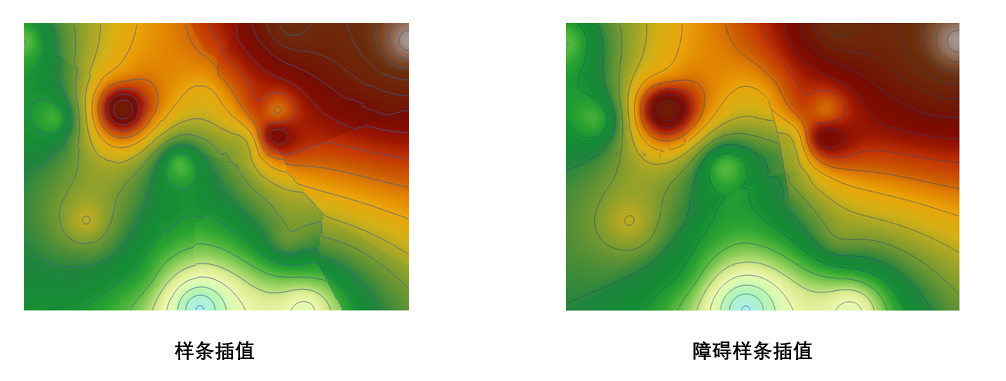Barrier Splines
Feature Description
Barrier splines can interpolate data while bypassing obstacles to ensure simulation accuracy. Currently only supports line datasets.
Common obstacle types include: faults, cliffs, coastlines.
Application Scenarios
Contour extraction of gas concentration with barrier separation for safety monitoring in coal mining exploration.
Applications in hydrology (water quality simulation) and meteorology.
Parameter Description
| Parameter | Default Value | Description | Parameter Type |
|---|---|---|---|
| Source Dataset | The point dataset for interpolation analysis | DatasetVector | |
| Obstacle Dataset | Barrier dataset (currently only supports line datasets) | DatasetVector | |
| Field | Field storing numerical values (elevation, precipitation, etc.) for interpolation. Text-type fields not supported. | String | |
| Scaling Ratio | 1.0 | Multiply source data values by this ratio before interpolation. For example: ratio=2 makes raster values ~2× original. Typically set to 1. | Double |
| Target Datasource | Datasource storing result dataset | Datasource | |
| Pixel Format | Pixel format | PixelFormat | |
| No Value | 0 | NoData value | Double |
| Expected Points (Optional) |
0 | Desired number of points for interpolation | Int |
| Resolution | 0 | Spatial resolution of result (ground area per pixel). Unit matches dataset unit. | Double |
| Smoothness | 0.100000001490116 | Smoothing coefficient [0,1] | Double |
| Tension | 0 | Tension coefficient | Double |
| Geographic Extent of Result Dataset (Optional) |
Analysis extent setting | string |
Output
| Parameter | Description | Parameter Type |
|---|---|---|
| Result Dataset | Name of output dataset | String |
The left figure shows interpolation without obstacle dataset, the right shows interpolation with obstacle dataset.




